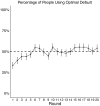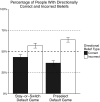Default neglect in attempts at social influence
- PMID: 29222183
- PMCID: PMC5748189
- DOI: 10.1073/pnas.1712757114
Default neglect in attempts at social influence
Abstract
Current theories suggest that people understand how to exploit common biases to influence others. However, these predictions have received little empirical attention. We consider a widely studied bias with special policy relevance: the default effect, which is the tendency to choose whichever option is the status quo. We asked participants (including managers, law/business/medical students, and US adults) to nudge others toward selecting a target option by choosing whether to present that target option as the default. In contrast to theoretical predictions, we find that people often fail to understand and/or use defaults to influence others, i.e., they show "default neglect." First, in one-shot default-setting games, we find that only 50.8% of participants set the target option as the default across 11 samples (n = 2,844), consistent with people not systematically using defaults at all. Second, when participants have multiple opportunities for experience and feedback, they still do not systematically use defaults. Third, we investigate beliefs related to the default effect. People seem to anticipate some mechanisms that drive default effects, yet most people do not believe in the default effect on average, even in cases where they do use defaults. We discuss implications of default neglect for decision making, social influence, and evidence-based policy.
Keywords: choice architecture; decision making; default effect; nudges; social influence.
Conflict of interest statement
The authors declare no conflict of interest.
Figures



Comment in
-
Reply to Jung et al.: Default neglect persists over time and across contexts.Proc Natl Acad Sci U S A. 2018 Aug 28;115(35):E8107-E8108. doi: 10.1073/pnas.1811622115. Epub 2018 Aug 14. Proc Natl Acad Sci U S A. 2018. PMID: 30108149 Free PMC article. No abstract available.
-
People can recognize, learn, and apply default effects in social influence.Proc Natl Acad Sci U S A. 2018 Aug 28;115(35):E8105-E8106. doi: 10.1073/pnas.1810986115. Epub 2018 Aug 14. Proc Natl Acad Sci U S A. 2018. PMID: 30108150 Free PMC article. No abstract available.
References
-
- Johnson EJ, Goldstein D. Do defaults save lives? Science. 2003;302:1338–1339. - PubMed
-
- Bernheim BD, Forni L, Gokhale J, Kotlikoff LJ. How much should Americans be saving for retirement? Am Econ Rev. 2000;90:288–292.
-
- Kirkham E. 2016 1 in 3 Americans has saved $0 for retirement. Time.com Money. Available at time.com/money/4258451/retirement-savings-survey/. Accessed July 19, 2017.
-
- Madrian BC, Shea DF. The power of suggestion: Inertia in 401(k) participation and savings behavior. Q J Econ. 2001;116:1149–1187.
Publication types
MeSH terms
LinkOut - more resources
Full Text Sources
Other Literature Sources
Molecular Biology Databases

